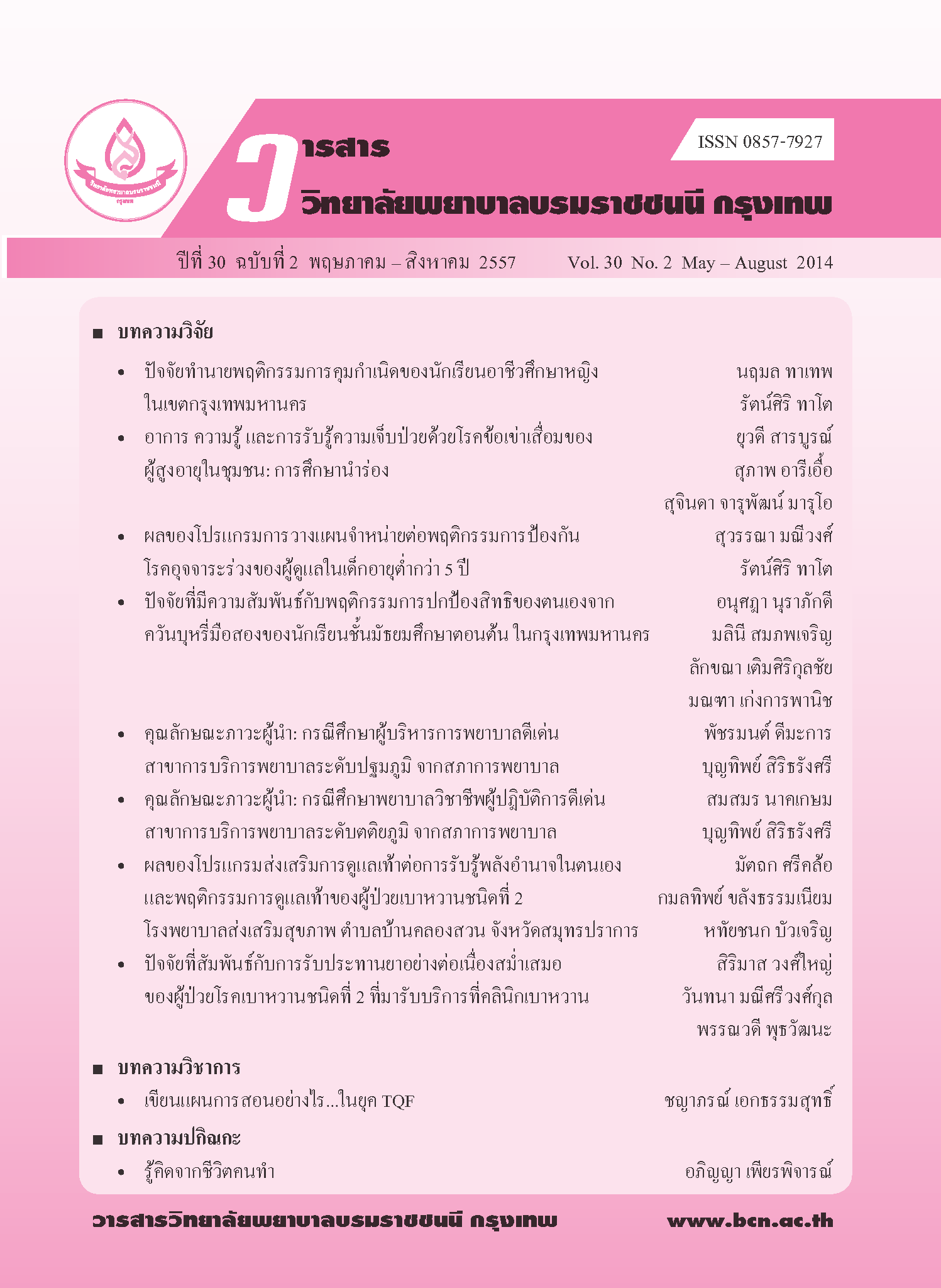ปัจจัยที่มีความสัมพันธ์กับพฤติกรรมการปกป้องสิทธิของตนเองจากควันบุหรี่มือสอง ของนักเรียนชั้นมัธยมศึกษาตอนต้น ในกรุงเทพมหานคร FACTORS CORRELATED WITH ASSERTIVE BEHAVIOR FROM SECOND-HAND SMOKE IN SECONDARY SCHOOL STUDENTS IN BANGKOK METROPOLITAN
คำสำคัญ:
พฤติกรรมการปกป้องสิทธิ, ควันบุหรี่มือสอง, Assertive Behavior, Second-Hand Smokeบทคัดย่อ
บทคัดย่อ
การศึกษาเชิงสำรวจนี้มีวัตถุประสงค์เพื่อศึกษาปัจจัยที่มีความสัมพันธ์กับพฤติกรรมการปกป้องสิทธิของตนเองจากควันบุหรี่มือสองของนักเรียนชั้นมัธยมศึกษาตอนต้นในกรุงเทพมหานคร จำนวน 414 ราย ซึ่งเป็นผู้เคยได้รับควันบุหรี่มือสอง เก็บรวบรวมข้อมูลด้วยแบบสอบถาม วิเคราะห์ข้อมูลด้วยสถิติจำนวน ร้อยละ ค่าเฉลี่ย ส่วนเบี่ยงเบนมาตรฐานและไคสแควร์
ผลการศึกษาพบว่า กลุ่มตัวอย่างที่เคยได้รับควันบุหรี่มือสองเคยสูบบุหรี่ ร้อยละ 12.3 และไม่เคยสูบบุหรี่ ร้อยละ 87.7 ส่วนใหญ่มีพฤติกรรมปกป้องสิทธิของตนเองจากควันบุหรี่มือสองแบบ ไม่กล้าแสดงออก ได้แก่ การไม่สนใจ/เฉยๆ เดินหนี ร้อยละ 45.1 และร้อยละ 35.1 การศึกษาความสัมพันธ์พบว่า ปัจจัยส่วนบุคคล ได้แก่ เพศ ระดับชั้นเรียน พฤติกรรมเคย/ไม่เคยสูบบุหรี่ มีความสัมพันธ์กับพฤติกรรมปกป้องสิทธิของตนเองจากควันบุหรี่มือสอง อย่างมีนัยสำคัญทางสถิติ (p < 0.05) ปัจจัยภายในตัวบุคคล ได้แก่ การรับรู้อันตรายของควันบุหรี่มือสอง การรับรู้ความสามารถของตนเองในการปกป้องสิทธิ ความรู้เกี่ยวกับกฎหมายคุ้มครองสุขภาพและสิทธิตามกฎหมายของผู้ไม่สูบบุหรี่ ทักษะการตัดสินใจและการแก้ปัญหา และทักษะการสร้างสัมพันธภาพและการสื่อสาร ไม่มีความสัมพันธ์กับพฤติกรรมปกป้องสิทธิของตนเองจากควันบุหรี่มือสอง ปัจจัยสิ่งแวดล้อมภายนอก ได้แก่ หลักสูตรการเรียน/การสอนในโรงเรียน และการรับชมสื่อรณรงค์เกี่ยวกับอันตรายของควันบุหรี่มือสองไม่มีความสัมพันธ์กับพฤติกรรมปกป้องสิทธิของตนเองจากควันบุหรี่มือสอง
ดังนั้น กระทรวงสาธารณสุขและหน่วยงานที่เกี่ยวข้อง ควรรณรงค์สร้างกระแส กระตุ้นให้บุคคลรับรู้สิทธิของตนเองและรู้วิธีการที่เหมาะสมในการปกป้องสิทธิของตนเอง รวมทั้งประชาสัมพันธ์อย่างกว้างขวางถึงแหล่งรับเรื่องร้องเรียนเมื่อพบการละเมิดสิทธิ
ABSTRACT
This survey research aimed to study the factors correlated with assertive behavior when exposed to second-hand smoke exposure in secondary school students in Bangkok Metropolis. The sample was composed of 414 secondary school students who had been exposed to second-hand smoke. Data were collected by using a questionnaire and were analyzed by computing statistics in regard to frequency, percentage, arithmetic mean, and chi-square.
The results showed that had been exposed to second-hand smoke 12.3% ; had never smoked 87.7% ; and most of the sample performed behaviors when exposed to second-hand smoke, i.e., “did not pay attention to” “did not notice”, or “walked away”, (45.1% and 35.1%, respectively). In regard to the correlation analysis, it was found that personal factors in regard to sex, class level, and smoking behavior (had smoked/never smoked) were found to correlate significantly with assertive behavior when exposed to second-hand smoke (p-value<0.05). Intrinsic factors related to perceived severity of being exposed to second-hand smoke, perceived-self-efficacy to perform assertive behavior, knowledge about the Health Protection Law and legal right of non-smokers, decision-making and problem-solving skills, and human relations and communication skills were found not to correlate significantly with assertive behavior regarding second-hand smoke. Besides, environmental factors concerned with the school’s teaching-learning curriculum and exposure to media campaigns about the dangers of second-hand smoke were found not to correlate with assertive behavior regarding second-hand smoke.
Thus, the Ministry of Public Health and related organizations should carry out media campaigns in order to stimulate people to perceive their own rights and understand the appropriate methods to perform behaviors to protect their own rights including carrying on public relations activities on a larger scale to inform the public.
Downloads
เผยแพร่แล้ว
How to Cite
ฉบับ
บท
License
บทความที่ได้รับการตีพิมพ์ เป็นลิขสิทธิ์ของวารสารวิจัยสุขภาพและการพยาบาล (วิทยาลัยพยาบาลบรมราชชนนี กรุงเทพ) ไม่สามารถนำไปตีพิมพ์ซ้ำในวารสารฉบับอื่น

















